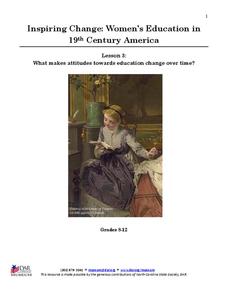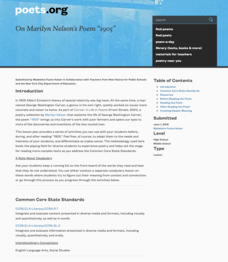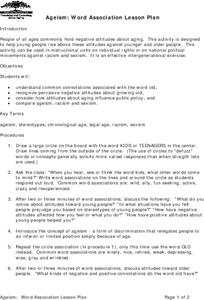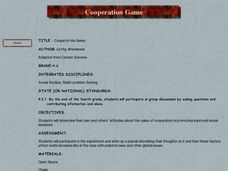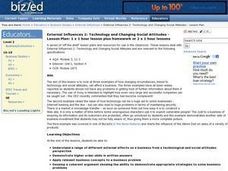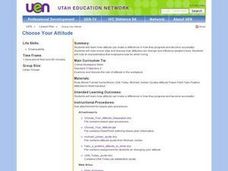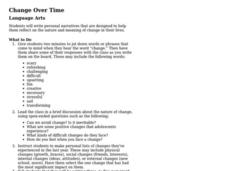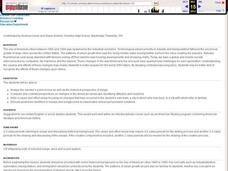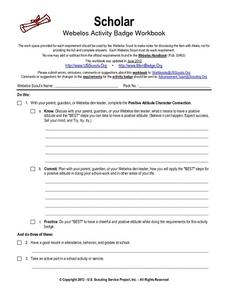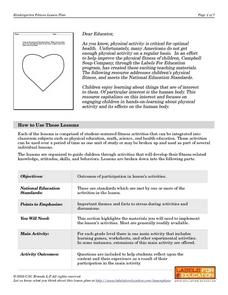Overcoming Obstacles
Managing Stress
The final lesson plan in the High School and Beyond Module focuses on stress management. The big idea here is that situations themselves are not stressful, but how one perceives stress is the issue. With that point in mind, participants...
Center for History Education
Women's Rights in the American Century
Today, many young people find it hard to understand why it took over 150 years for women in the United States to get the right to vote—why there was even a need for the suffrage movement. As they read a series of primary source...
Curated OER
Physical Needs
Tenth graders develop positive attitudes toward older adults. They examine the continuity of life and its impact on youth to improve quality of life and develop occupational skills related to mature adults.
Curated OER
Dangerous Road: A Letter of Complaint
Engage your English learners with this resource. To begin, learners describe a map to a partner. After a vocabulary exercise and a jumbled letter activity, pupils are asked to write their own letter. The letter reading and writing...
Curated OER
Understanding the Needs of the Aging
Students recognize the physical changes of old age. They identify and differentiate diseases of old age. They discuss stereotyping and complete written summaries of their responses.
Curated OER
Working to Overcome Stereotyping
Students design and conduct a survey to develop an understanding of the challenges inherent in changing attitudes and overcoming stereotypes about the Muslim religion and culture. They create multimedia presentations of the findings.
Curated OER
The Source of Knowledge
Students explore their impressions of several countries and the sources of information that informed those impressions. They examine the changing attitudes of South Koreans toward North Korean by reading and discussing "New Craze in...
Curated OER
Lexis: changing attitudes
Students notice lexical items as chunks of language. They use grammar of multi words and are introduced to a lexical set connected to money. Students are given a chance to peer teach. They are encouraged to use dictionaries.
Stanford University
Arabian Peninsula
How do cultural differences affect our view of history? The assessment geared towards high school historians, focuses on the credibility of primary sources. Young academics analyze a text and complete short answer questions to determine...
National Society Daughters of the American Revolution
Lesson 3: What Makes Attitudes Towards Education Change over Time?
The struggle for women's rights is not unique to this generation, or even to the 20th century. Class members explore the conflicting opinions of Alexander Graham Bell and his wife, Mabel Hubbard Bell, regarding women's pursuits of higher...
Learning for Justice
Challenging Gender Stereotyping and Homophobia in Sports
Young learners are asked to challenge what they see as stereotyping and homophobia in sports and the arts. Participants read an article about sexual orientation in the NFL and statements from public figures like Theodore Roosevelt. They...
Academy of American Poets
On Marilyn Nelson's Poem “1905”
Marilyn Nelson's poem, "1905," asks young scholars to compare and contrast George Washington Carver and Albert Einstein. After studying images of the two scientists and listing their observations, class members listen to several readings...
Curated OER
Ageism: Word Association Lesson Plan
Students discuss the attitudes related to the word old. In groups, they identify negative stereotypes about getting older and determine how these attitudes affect public policy on the elderly. They compare and contrast the concepts of...
Curated OER
Cooperation Game
Students determine their own and other's attitudes about the value of cooperatation in promoting improved social decision making.
Broward County Schools
ABC’s of Bullying Prevention
What is the problem? Why should I care? What can I do about it? These three questions are at the heart of a program designed to lead young people to understand that the way to prevent bullying is for their Attitude and Behavior to Change...
Curated OER
Technology and Changing Social Attitudes
Students investigate three examples of how changing circumstances, linked to technology and social attitudes, affect a business. They complete an activity and participate in discussion.
Curated OER
Choose Your Attitude
Students explore how attitude can make a difference in how they progress and become successful. They view movie clips and discuss how attitudes can change and influence people's lives. Students look at characteristics that employers look...
Curated OER
Changes In Matter, "The Big Chill"
Third graders investigate why ice cream does not go through any chemical changes when it is exposed to physical changes. They describe the three states of matter in either written or verbal form. Then students experiment with ice cream...
Curated OER
Change Over Time
Students write a personal narrative that is designed to help them reflect on the nature and meaning of change in their lives.
Curated OER
You Don’t Know What You’ve Got Until It’s Gone: The Changing American Landscape
Students examine the changing American landscape. In this cause and effect lesson, students listen to rock music that exemplifies urban growth in America and the interconnectedness of America today. Students write cause and effect essays...
Curated OER
An Attitude of Change
Students examine ways in which businesses change and what it takes to make the changes and keep ahead of the competition.
Curated OER
Scholar/ Webelos Activity Book
In this psychology worksheet, students answer 13 questions that are focused upon measuring the attitude of positive thinking and its influence upon learning.
Curated OER
Leveling the Gender Playing Field
Students explore whether or not the gender 'playing field' is becoming more level. They share their views by responding to questions regarding changing attitudes about women and men in the past, present and future.
Curated OER
Change the Beat
Brainstorm the reasons why a healthy heart is important. Using a diagram, label and locate the heart and discuss its function. Practice finding your heartbeat and describe the effects of physical activity on the heart. Also perform an...











